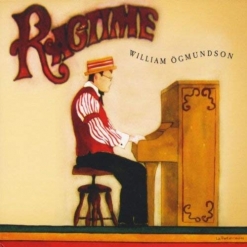With all of the work I’ve done with so-called “new age” and contemporary music, it often comes as a surprise that I have a deep passion for ragtime piano that goes back to well before “new age” music was ever heard of. I read everything I could find on ragtime composers and pianists, bought all the sheet music available at the time, and collected all of the recordings I could find. I’m so excited that I discovered William Ogmundson’s 2008 release simply titled
Ragtime. The fourteen tracks include six of Scott Joplin’s rags, two by Joseph Lamb, one by Mark Janza and three originals. The album also includes a wonderful performance of “Bumble Boogie” and a piano and vocal version of “You’ve Gotta See Mama Ev’ry Night.” All but the last track are solo piano. Ogmundson plays the “classic” rags close to how they were written with some fun embellishments. Many people think all ragtime music is fast and “showy,” but Joplin and many of his contemporaries stated specifically on their sheet music that “it is never right to play
Ragtime fast.” Ogmundson obviously knows and respects this and does a wonderful job of preserving these gems as they were meant to be heard. His three original rags also honor the ragtime traditions and fit in beautifully with the “classics” even though most of them are well over a hundred years old.
Appropriately,
Ragtime begins with Scott Joplin’s “The Entertainer,” the piece that was used as the theme for the movie
The Sting (1973) and was referred to as “The Sting” for several years. “The Entertainer” charmed people of all ages and re-introduced ragtime to audiences all over the world seventy years after it was composed. “The Cascades” was written in 1904 and is often used in reference to the early part of the 20th century. “Weeping Willow” is light, carefree and very beautiful. “Maple Leaf Rag” was Joplin’s most successful piece and was the first sheet music to sell more than a million copies. Composed in 1899, it’s still a very infectious toe-tapper and one of my favorite pieces to play. Ogmundson’s performance is stellar! “Solace” is very different and is sub-titled “A Mexican Serenade.” It has a slow Latin rhythm that suits the sweet melody perfectly. “The Crush Collision March” is one of Joplin’s earliest pieces. Composed in 1896, it was written to commemorate a staged train collision in Crush, Texas earlier that year.
Joseph Lamb isn’t nearly as well-known as Scott Joplin, but he also wrote a large body of ragtime music. Ogmundson performs “The Top Liner” and “
Ragtime Nightingale,” two of Lamb’s best. The last of the classic rags is “The Lion Tamer” by Mark Janza - a light and playful delight!
“Puck’s Night Out” is the first of the three Ogmundson originals. It was composed for for a 2006 production of A Midsummer’s Night Dream - fun and very playful! “Hiccups” is livelier and dances all over the piano - I really like this one, too! “Charleston Cakewalk” hints at short snippets from James P. Johnson’s “Charleston,” but is another excellent Ogmundson original.
The last two tracks aren’t really rags. I love playing “Bumble Boogie,” which was written by Jack Fina in 1947 and IS supposed to be played as fast as possible - which Ogmundson does to perfection! The last piece is “You’ve Gotta See Mama Ev’ry Night” by Billy Rose and Con Conrad. The song is sung by Mary Jane Ogmundson, accompanied by William on piano and is a wonderful closing to a great album!
Ragtime is available from
www.WilliamOgmundson.com, Amazon, iTunes and CD Baby. Don’t miss it!

